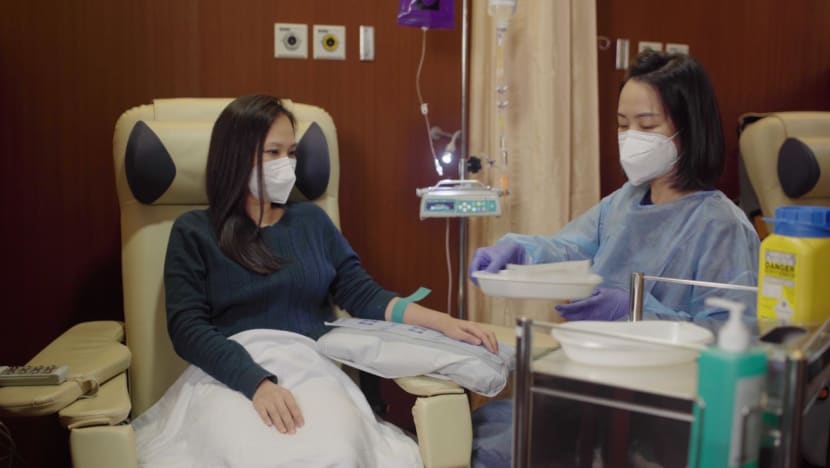The Science and Heart of Holistic Cancer Care
A successful cancer plan often involves both a multidisciplinary team of experts and the use of new treatment therapies.

Advancements in immunotherapy, targeted therapy, monoclonal antibody drugs and chemotherapy add to the arsenal of treatment options now available to cancer patients.
With more than a hundred types of cancer that grow, mutate, spread and respond to treatment in different ways, finding a single cure-for-all remains elusive.
However, the relentless pursuit of researchers in the last few decades has led to better prevention, diagnosis and treatment.
According to Dr Ang Peng Tiam who started practising oncology in 1986, chemotherapy used to be the solution course of treatment for patients with advanced cancer.
However, over the past three decades, he notes a growing armamentarium of new medicines, "which are more effective in killing the cancer cells and also have lesser side effects.”
As Dr Ang also points out, “chemotherapy is not obsolete, it can be used alone or in combination with monoclonal antibodies or immunotherapy to achieve better treatment results.”
The Role of Immunotherapy
Immunotherapy is one of the latest buzzwords in the treatment arena.

Describing immunotherapy as a medicine, Dr Richard Quek, Senior Consultant in Medical Oncology at Parkway Cancer Centre, explains that the treatment “raises the immune system of the patient, allowing the immune system to recognise the cancer and destroy it from within.”
“Because the treatment is specific to one’s immune system, and not specific to any individual cancer, it’s effective in a broad range of cancers” he adds.
Dr Quek has also observed that the side effects from immunotherapy are much more tolerable, with treatment outcomes resulting in "longer survival and a better quality of life."
Targeted Therapy and Monoclonal Antibodies
With newer treatments generally being less toxic, experts have observed that patients have become more willing to stick with their treatment regimen.
Alongside immunotherapy, another treatment that oncologists can administer is targeted therapy.
It is a cancer treatment that uses drugs that target specific genes and proteins that are involved in the growth and survival of the cancer cell, explains Dr Ang who is Medical Director and Senior Consultant in Medical Oncology at Parkway Cancer Centre.
“Targeted therapy can also affect the tissue environment that helps the cancer cell to grow and survive. For example, we can target the blood vessel cells, thereby cutting off the blood supply and starving the cancer cells of the nutrients.”

Oncologists can also prescribe treatment using monoclonal antibodies, which as Dr Ang explains “can disrupt the signaling network that drives the cancer cell to grow”.
He says that both targeted therapy and monoclonal antibodies treatments are largely without significant side effects.
“This means that as long as the disease is responding to the treatment, patients can continue to use these drugs for an extended period of time.”
A Multidisciplinary Approach
In treating each cancer patient and their complex affliction, a treatment plan often means that the medical oncologists do not work alone.
Often, both Dr Ang and Dr Quek draw on Parkway Cancer Centre’s multidisciplinary team of surgeons, radiation specialists and pathologists, just to name a few.
Improved cancer care with a multidisciplinary team of experts adopting new treatments.
As Dr Quek points out, “cancer is a complex disease and it takes a whole, big team to cure cancer.”
“Today, treating a cancer patient often involves a multidisciplinary team” says Dr Ang who also notes that professionals in cancer care are moving away from working in silos. Embracing collaborative work he says, allows for a better understanding of the different roles and capabilities.
Being able to tap on the knowledge and support from subspecialists with expert knowledge on the different cancer types is important, points out Dr Ang, adding that “it is very difficult for an individual oncologist to keep abreast of all the developments in this fast-changing field”.
Such knowledge sharing therefore allows the experts to plan the treatment options for each individual patient.
Science and Heart of Cancer Care
With the growing ability to study cancers at a molecular level, Dr Ang is excited about the potential it holds for personalised cancer care.
He acknowledges that experts are still far away from being “able to define an actionable mutation” for every patient but appreciates that the growing ability to understand tumour specimens and mutations in greater detail will lead to the furthering of precision medicine.
“Precision medicine means that it's not one-size-fits all, it is really to find the most appropriate treatment for that individual patient” he says.
“But for the patient, it makes a tremendous difference … their quality of life is much better and also the effectiveness of the treatment is much higher.”

As for Dr Quek, he is optimistic over immunotherapy’s success in treating earlier stages of cancer and when treatment is applied immediately after surgery to prevent cancer relapses.
With success recorded in resected stage three melanoma, and more recently in resected lung and kidney cancer, Dr Quek is confident of clinical trials in the next five to eight years that will apply this strategy successfully to a wider variety of cancers.
“Even with the growth of technology, caring for cancer patients is not just a matter of science, it is a matter of the heart” says Dr Quek, reminding that nurses, counsellors and other allied health professionals, play a significant role alongside the multidisciplinary team that together, support cancer patients in a holistic approach to recovery.
Produced in partnership with Parkway Cancer Centre. 










